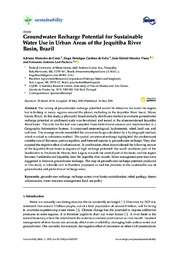Groundwater recharge potential for sustainable water use in urban areas of the Jequitiba River basin, Brazil.
Groundwater recharge potential for sustainable water use in urban areas of the Jequitiba River basin, Brazil.
Summary: The zoning of groundwater recharge potential would be attractive for water managers, but is lacking in many regions around the planet, including in the Jequitiba River basin, Minas Gerais, Brazil. In this study, a physically based spatially distributed method to evaluate groundwater recharge potential at catchment scale was developed and tested in the aforementioned Jequitiba River basin. The data for the test was compiled from institutional sources and implemented in a Geographic Information System. It comprised meteorological, hydrometric, relief, land use, and soil data. The average results resembled the annual recharge calculated by a hydrograph method, which worked as validation method. The spatial variation of recharge highlighted the predominant contribution of flat areas, porous aquifers, and forested regions to groundwater recharge. They also exposedthenegativeeffectofurbanization. Incombination,thesefactorselectedthefollowingsectors of the Jequitiba River basin as regions of high recharge potential: the south-southeast part of the headwaters in Prudente de Morais; Sete Lagoas towards the central part of the basin; and the region between Funilândia and Jequitiba, near the Jequitiba river mouth. Some management practices were suggested to improve groundwater recharge. The map of groundwater recharge potential produced in this study is valuable and is therefore proposed as tool for planners in the sustainable use of groundwater and protection of recharge areas.
Publication year: 2019
Types of publication: Journal article
Unit: Embrapa Maize & Sorghum
Keywords: Bacia Hidrográfica, Geologia, Política, Recurso Hídrico, Uso da Terra
Observation
Some of Embrapa's publications are published as ePub files. To read them, use or download one of the following free software options to your computer or mobile device. Android: Google Play Books; IOS: iBooks; Windows and Linux: Calibre.
Access other publications
Access the Agricultural Research Database (BDPA) to consult Embrapa's full library collection and records.
Visit Embrapa Bookstore to purchase books and other publications sold by Embrapa.

